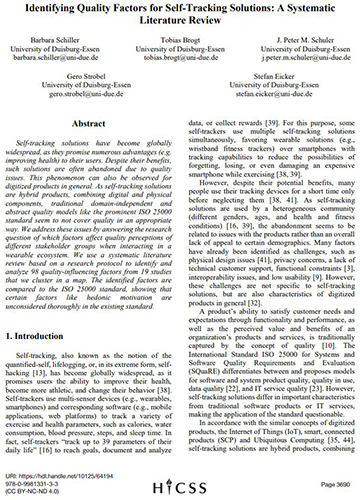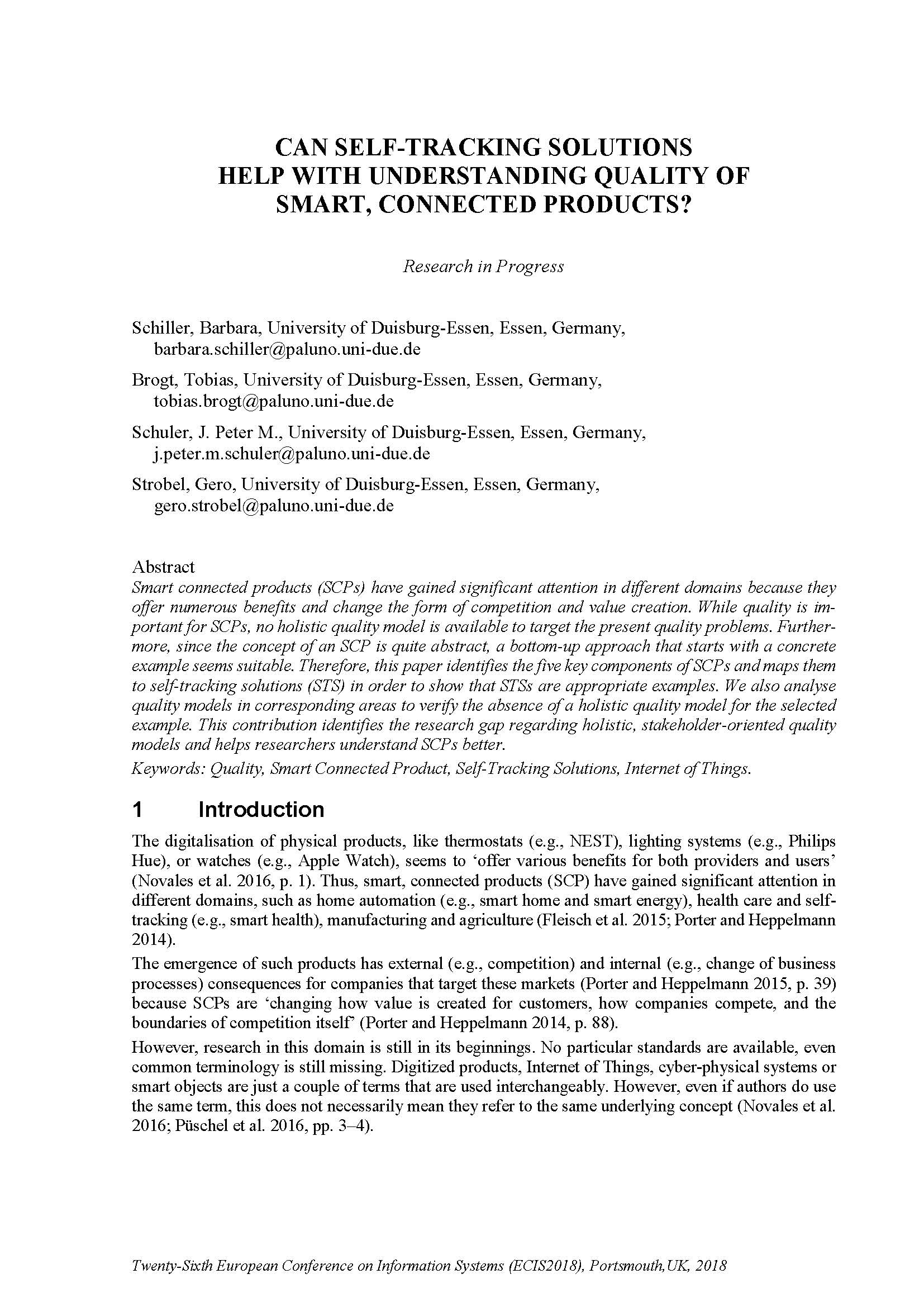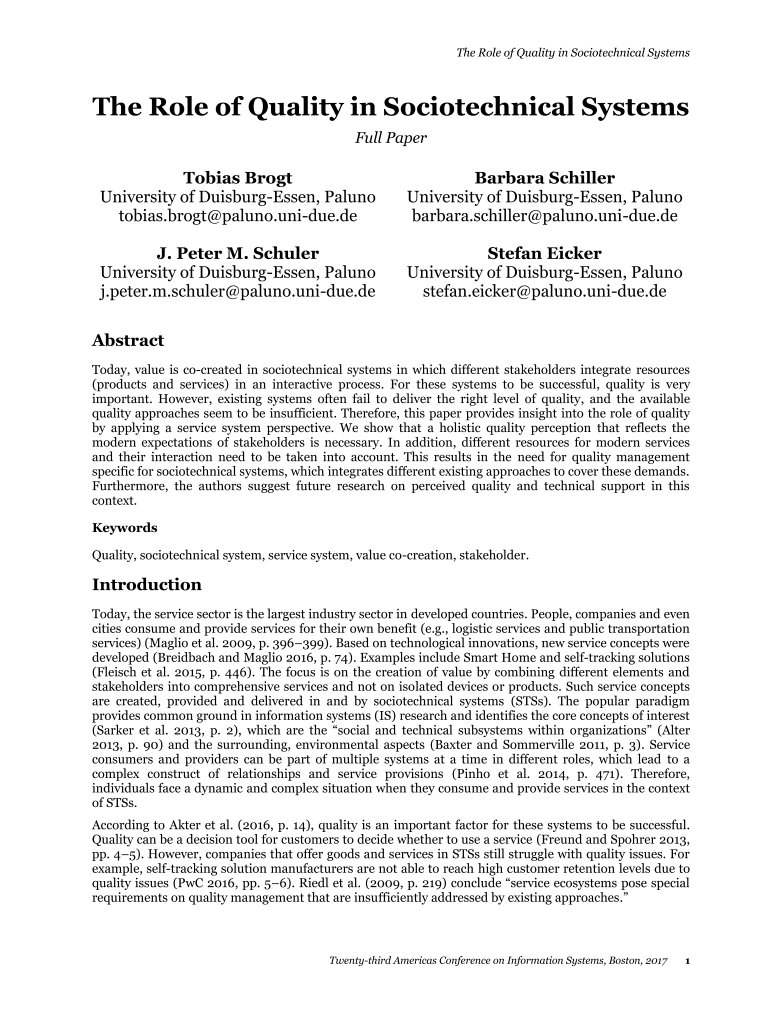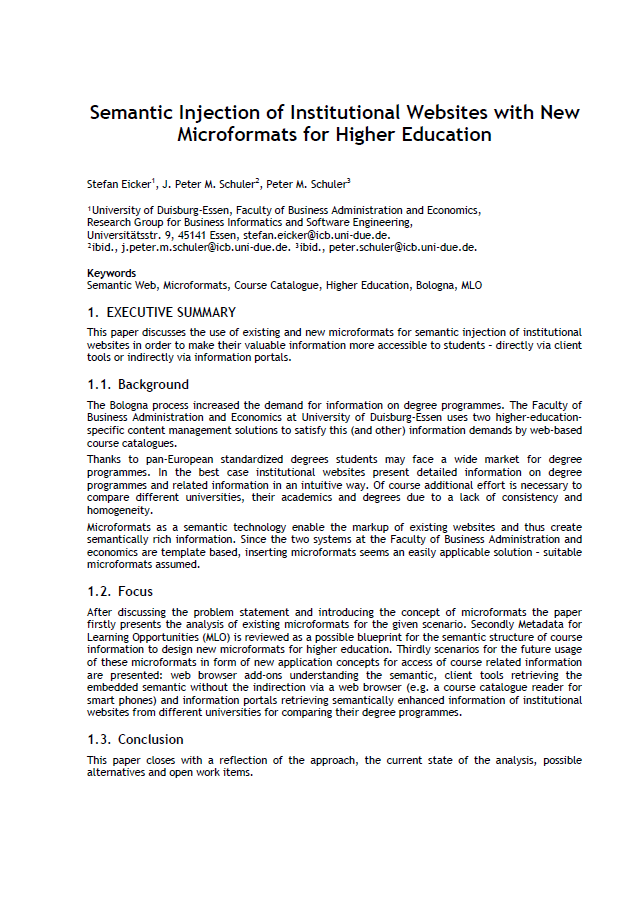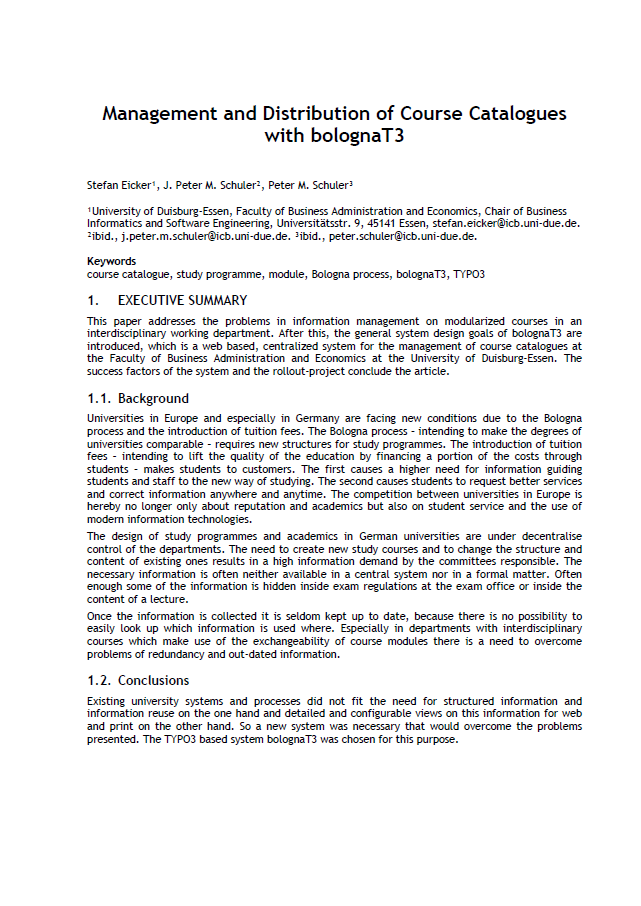Person

Zentralfunktion im Dekanat
Dipl.-Wirt.-Inf. J. Peter M. Schuler
- Raum:
- R12 R07 B23
- Telefon:
- +49 201 18-33578
- E-Mail:
- j.peter.m.schuler (at) uni-due.de
- X.509 Cert:
- Nutzerzertifikat auf DFN.de
- Adresse:
- Universität Duisburg-Essen, Campus Essen
Fakultät für Wirtschaftswissenschaften
Universitätsstr. 12
45141 Essen
Kontaktperson für:
- Ansprechpartner für Digitalisierung, IT- und Prozessmanagement für die Fakultät für Wirtschaftswissenschaften
- Ansprechpartner für das WIWI-TYPO3 (bitte Funktionsadresse typo3.projektleitung (at) wiwinf.uni-due.de nutzen)
- Ansprechpartner für d.velop-DMS-Nutzung in der Fakultät für Wirtschaftswissenschaften
- IKM-Beauftragter der Fakultät für Wirtschaftswissenschaften
Zur Person:
Als wissenschaftlicher Mitarbeiter habe ich mich die letzten Jahre auf die Gestaltung von Prozessen und Informationssystemen fokussiert. Die Entwicklung von Hochschul-IT als Lösung für zentrale und dezentrale Herausforderungen sowohl in Form von Prozess-Best-Practices als auch in Form von konkreten unterstützenen IT-Systemen ist dabei regelmäßig Kernaufgabe gewesen. Durch Forschung und Lehre im Kontext dieser Bereiche habe ich das Wissen und den Austausch darüber stehts auf aktuellem Stand halten können, u.a. auch als Dozent in einem berufsbegleitenden Weiterbildungsstudiengang.
Lebenslauf:
- seit Dezember 2023: Mitarbeiter für Digitalisierung, IT- und Prozessmanagement der Fakultät für Wirtschaftswissenschaften
- April 2008 bis März 2023: Wissenschaftlicher Mitarbeiter am Lehrstuhl für Wirtschaftsinformatik und Softwaretechnik (Lehrstuhlinhaber: Prof. Dr. Stefan Eicker) an der Universität Duisburg-Essen
- März 2008: Abschluss des Wirtschaftsinformatik-Studiums als Dipl.-Wirt.-Inf. an der Universität Duisburg-Essen
- September 2005 bis März 2008: Studentische Hilfskraft am Lehrstuhl für Wirtschaftsinformatik und Softwaretechnik (Lehrstuhlinhaber: Prof. Dr. Stefan Eicker) an der Universität Duisburg-Essen
Publikationen:
- Schiller, Barbara; Brogt, Tobias; Schuler, J. Peter M.; Strobel, Gero; Eicker, Stefan: Identifying Quality Factors for Self-Tracking Solutions: A Systematic Literature Review. In: Proceedings of the 53nd Hawaii International Conference on System Sciences. Hawaii, USA 2020. doi:10.24251/HICSS.2020.452BIB DownloadKurzfassung
Self-tracking solutions have become globally widespread, as they promise numerous advantages (e.g. improving health) to their users. Despite their benefits, such solutions are often abandoned due to quality issues. This phenomenon can also be observed for digitized products in general. As self-tracking solutions are hybrid products, combining digital and physical components, traditional domain-independent and abstract quality models like the prominent ISO 25000 standard seem to not cover quality in an appropriate way. We address these issues by answering the research question of which factors affect quality perceptions of different stakeholder groups when interacting in a wearable ecosystem. We use a systematic literature review based on a research protocol to identify and analyze 98 quality-influencing factors from 19 studies that we cluster in a map. The identified factors are compared to the ISO 25000 standard, showing that certain factors like hedonic motivation are unconsidered thoroughly in the existing standard.
- Schiller, Barbara; Brogt, Tobias; Schuler, J. Peter M.; Strobel, Gero: Can Self-Tracking Solutions Help with Understanding Quality of Smart, Connected Products?. In: Ais (Hrsg.): Proceedings of the 26th European Conference on Information Systems (ECIS). Portsmouth 2018. BIB DownloadKurzfassung
Smart connected products (SCPs) have gained significant attention in different domains because they offer numerous benefits and change the way of competition and value creation. While quality is im-portant for SCPs, no holistic quality model is available to target the present quality problems. Further-more, since the concept of an SCP is quite abstract, a bottom-up approach that starts with a concrete example seems suitable. Therefore, this paper identifies the five key components of SCPs and maps them to self-tracking solutions (STS) in order to show that STSs are suitable substitutes. We also analyse quality models in corresponding areas to verify the absence of a holistic quality model for the selected example. This contribution identifies the research gap regarding holistic, stakeholder-oriented quality models and helps researchers understand SCPs better.
- Brogt, Tobias; Schiller, Barbara; Schuler, J. Peter M.; Eicker, Stefan: The Role of Quality in Sociotechnical Systems. In: Ais (Hrsg.): Proceedings of AMCIS 2017 - Twenty-third Americas Conference on Information Systems. Boston 2017. VolltextBIB DownloadKurzfassung
Today, value is co-created in sociotechnical systems in which different stakeholders integrate resources (products and services) in an interactive process. For these systems to be successful, quality is very important. However, existing systems often fail to deliver the right level of quality, and the available quality approaches seem to be insufficient. Therefore, this paper provides insight into the role of quality by applying a service system perspective. We show that a holistic quality perception that reflects the modern expectations of stakeholders is necessary. In addition, different resources for modern services and their interaction need to be taken into account. This results in the need for quality management specific for sociotechnical systems, which integrates different existing approaches to cover these demands. Furthermore, the authors suggest future research on perceived quality and technical support in this context.
- Eicker, Stefan; Schuler, J. Peter M.; Schuler, Peter M.: Semantic Injection of Institutional Websites with New Microformats for Higher Education. In: 15th International Conference of European University Information Systems (EUNIS 2009). Santiago de Compostela, Spain 2009. PDFBIB DownloadKurzfassung
1. EXECUTIVE SUMMARY
This paper discusses the use of existing and new microformats for semantic injection of institutional websites in order to make their valuable information more accessible to students – directly via client tools or indirectly via information portals.
1.1. Background
The Bologna process increased the demand for information on degree programmes. The Faculty of Business Administration and Economics at University of Duisburg-Essen uses two higher-educationspecific content management solutions to satisfy this (and other) information demands by web-based course catalogues.
Thanks to pan-European standardized degrees students may face a wide market for degree programmes. In the best case institutional websites present detailed information on degree programmes and related information in an intuitive way. Of course additional effort is necessary to compare different universities, their academics and degrees due to a lack of consistency and homogeneity.
Microformats as a semantic technology enable the markup of existing websites and thus create semantically rich information. Since the two systems at the Faculty of Business Administration and economics are template based, inserting microformats seems an easily applicable solution – suitable microformats assumed.
1.2. Focus
After discussing the problem statement and introducing the concept of microformats the paper firstly presents the analysis of existing microformats for the given scenario. Secondly Metadata for Learning Opportunities (MLO) is reviewed as a possible blueprint for the semantic structure of course information to design new microformats for higher education. Thirdly scenarios for the future usage of these microformats in form of new application concepts for access of course related information are presented: web browser add-ons understanding the semantic, client tools retrieving the embedded semantic without the indirection via a web browser (e.g. a course catalogue reader for smart phones) and information portals retrieving semantically enhanced information of institutional websites from different universities for comparing their degree programmes.
1.3. Conclusion
This paper closes with a reflection of the approach, the current state of the analysis, possible alternatives and open work items.<span id="1252314128046S"> <span id="1252314278278S"> </span>
</span> - Eicker, Stefan; Schuler, J. Peter M.; Schuler, Peter M.: Management and Distribution of Course Catalogues with bolognaT3. In: 14th International Conference of European University Information Systems (EUNIS 2008). Århus, Dänemark 2008. PDFBIB DownloadKurzfassung
1. EXECUTIVE SUMMARY
This paper addresses the problems in information management on modularized courses in an interdisciplinary working department. After this, the general system design goals of bolognaT3 are introduced, which is a web based, centralized system for the management of course catalogues at the Faculty of Business Administration and Economics at the University of Duisburg-Essen. The success factors of the system and the rollout-project conclude the article.
1.1. Background
Universities in Europe and especially in Germany are facing new conditions due to the Bologna process and the introduction of tuition fees. The Bologna process – intending to make the degrees of universities comparable – requires new structures for study programmes. The introduction of tuition fees – intending to lift the quality of the education by financing a portion of the costs through students – makes students to customers. The first causes a higher need for information guiding students and staff to the new way of studying. The second causes students to request better services and correct information anywhere and anytime. The competition between universities in Europe is hereby no longer only about reputation and academics but also on student service and the use of modern information technologies.
The design of study programmes and academics in German universities are under decentralise control of the departments. The need to create new study courses and to change the structure and content of existing ones results in a high information demand by the committees responsible. The necessary information is often neither available in a central system nor in a formal matter. Often enough some of the information is hidden inside exam regulations at the exam office or inside the content of a lecture.
Once the information is collected it is seldom kept up to date, because there is no possibility to easily look up which information is used where. Especially in departments with interdisciplinary courses which make use of the exchangeability of course modules there is a need to overcome problems of redundancy and out-dated information.
1.2. Conclusions
Existing university systems and processes did not fit the need for structured information and information reuse on the one hand and detailed and configurable views on this information for web and print on the other hand. So a new system was necessary that would overcome the problems presented. The TYPO3 based system bolognaT3 was chosen for this purpose.<span id="1252314076270S"><span id="1252314325711S"> </span></span>
Begleitete Abschlussarbeiten:
- Analyse der relevanten Anforderungen für die agile Softwareentwicklung eines sowohl benutzer- als auch unternehmensrelevanten Produkts mit Scrum (Masterarbeit Wirtschaftsinformatik, 2023)
- Analyse des Einflusses von Push-Benachrichtigungen auf die mentale Gesundheit: Herausforderungen und Lösungsansätze (Bachelorarbeit Wirtschaftsinformatik, 2023)
- Analyse des Einflusses von aktuellen Technologiekonzepten auf Logistik 4.0 (Bachelorarbeit Wirtschaftsinformatik, 2023)
- Stakeholder-orientierte Evaluation von Kl-gestützten Sprachassistenten: Ableitung von Designempfehlungen unter besonderer Berücksichtigung der Zielgruppe Kinder (Masterarbeit Wirtschaftsinformatik, 2023)
- Ermittlung von Gestaltungsempfehlungen für barrierefreie Apps mit Fokus auf Handmotorik, Sprechmotorik und Taubheit (Bachelorarbeit Wirtschaftsinformatik, 2023)
- Evaluation von Technologien zur Warnung der Bevölkerung im Katastrophenfall (Masterarbeit Wirtschaftsinformatik, 2023)
- Ende-zu-Ende Prozessautomatisierung - Ein Überblick über aktuelle Tools und einer Methode zur Auswahl und Priorisierung geeigneter automatisierbarer Prozesse (Masterarbeit Wirtschaftsinformatik, 2023)
- Analyse der Potenziale von Smart Home Appliances im Unternehmen zur Verbesserung von Mitarbeiterzufriedenheit und -komfort (Bachelorarbeit Wirtschaftsinformatik, 2022)
- Technology Addiction - development, prevention and coping from an IS-perspective (Bachelorarbeit Wirtschaftsinformatik, 2022)
- Bekämpfung von Cyber-Mobbing, Fake News und sensiblen Inhalten durch IT auf dem sozialen Netzwerk Instagram (Bachelorarbeit Wirtschaftsinformatik, 2022)
- Stakeholderorientierte Innovationen im Rahmen von IT-Carve-Outs: holistische Performancesteigerung aus operativer Perspektive (Masterarbeit Wirtschaftsinformatik, 2022)
- Proof-of-Turn: Blockchain consensus using a Round-Robin procedure as one possible solution for cutting costs in mobile games (Masterarbeit Wirtschaftsinformatik, 2021)
- AI-based digital assistants: An analysis of the potential application in enterprises and the development of a supporting design framework (Masterarbeit Wirtschaftsinformatik, 2021)
- Analyse der Konzepte und Methoden für die Etablierung der Innovationsentwicklung in Unternehmen am Beispiel der Automobilbranche (Bachelorarbeit Wirtschaftsinformatik, 2021)
- User Acceptance of the Internet of Things in Healthcare - Assessment of Information System Ergonomics among Smart Health Fitness Applications (Masterarbeit Wirtschaftsinformatik, 2021)
- Entwicklung eines Qualitätsmodell für Blockchain-Systeme nach ISO 25010 (Bachelorarbeit Wirtschaftsinformatik, 2020)
- Evaluation der Usability als Grundlage zur Steigerung der Effektivität von Corporate Websites (Bachelorarbeit Wirtschaftsinformatik, 2020)
- Konzeption eines Managementcockpits im Kontext moderner SAP-Technologien (Masterarbeit Wirtschaftsinformatik, 2018)
- Erweiterung des Geschäftsprozessmanagements unter Berücksichtigung der Charakteristik hedonischer Informationssysteme (Bachelorarbeit Wirtschaftsinformatik, 2018)
- Light iStar: A Lightweight Goal Modeling Approach (Masterarbeit Wirtschaftsinformatik, 2018)
- A modularity technique for business process modeling: An application in the Communication Analysis method (Masterarbeit Wirtschaftsinformatik, 2018)
- Analyse der Nutzungspotenziale von Augmented Reality im Einzelhandel (Bachelorarbeit Wirtschaftsinformatik, 2018)
- Entwicklung einer Methode zur Aufstellung von ITZ-Projektportfolios (Bachelorarbeit Wirtschaftsinformatik, 2018)
- Analyse von Technostress im Rahmen der Einführung von mobilen Applikationen im Enterprise Kontext (Bachelorarbeit Wirtschaftsinformatik, 2018)
- Analyse des strategischen Einsatzpotenzials von In-Memory-basierten betrieblichen Informationssystemen am Beispiel von SAP HANA (Masterarbeit Wirtschaftsinformatik, 2017)
- Ermittlung von Chancen und Herausforderungen der Virtualisierung als Green-IT-Lösung zur Effizienzsteigerung von Unternehmen (Bachelorarbeit Wirtschaftsinformatik, 2017)
- Analyse von Vorgehensmodellen und Identifikation von geeigneten Methoden für die Einführung von Industrie-4.0-Konzepten in Unternehmen (Bachelorarbeit Wirtschaftsinformatik, 2017)
- Konzeption und Evaluation eines Leitfadens zur Einführung von Suchmaschinenoptimierung für Unternehmen (Bachelorarbeit Wirtschaftsinformatik, 2017)
- Evaluation der Herausforderungen für Datenschutz und Datensicherheit im Kontext von Self-Tracking mit mHealth-Applikationen (Bachelorarbeit Wirtschaftsinformatik, 2017)
- Concept and Prototype for a Native App for Search on SAP HANA (Bachelorarbeit Wirtschaftsinformatik, 2016)
- Design of a catalogue of Measures for Handling Cultural Influences Conserning the Usability of Websites for Global Use (Masterarbeit Wirtschaftsinformatik, 2016)
- Kritische Erfolgsfaktoren der Informationsarchitektur bei Webanwendungen mit Responsive Design (Bachelorarbeit Wirtschaftsinformatik, 2016)
- Repräsentation von komplexen Datenobjekten in User Interfaces (Masterarbeit Wirtschaftsinformatik, 2013)
- Usability und UX in Unternehmen - Verankerung von Usability- und User-Experience-Methoden in der Entwicklung von Softwareproduktion (Masterarbeit Wirtschaftsinformatik, 2013)
- Evaluation von Konzepten und Methoden unterschiedlicher Ansätze des agilen Projektmanagements für die prototypische Entwicklung unterstützender Software auf mobilen Endgeräten. (Bachelorarbeit Wirtschaftsinformatik, 2012) KurzfassungDetails
Im Rahmen dieser Arbeit werden zunächst mobile Endgeräte näher betrachtet. Anschließend erfolgen die Vorstellung von Methoden und Konzepten des agilen Projektmanagements sowie die Erläuterung des Vorgehens zuvor ausgewählter agiler Methoden. Auf der Grundlage des Potenzials mobiler Endgeräte und Kon-zepten des agilen Projektmanagement findet die Konstruktion von Modifizie-rungskriterien statt, um Konzepte und Methoden des agilen PM auf mobilen End-geräten umzusetzen. Ergänzend werden die konstruierten Modifizierungskriterien auf die zuvor ausgewählten Methoden des agilen PMs angewandt, um die An-wendung dieser Kriterien zu betrachten. Anschließend werden die modifizierten Methoden, durch die Entwicklung eines grafischen Prototyps, visualisiert. Neben den Methoden werden weitere Funktionen in dem Prototyp grafisch umgesetzt, die auf Konzepten des agilen PM beruhen und mit dem Potenzial mobiler Endge-räte umgesetzt werden, um weitere Mehrwerte für die Anwender zu schaffen.
As part of this Bachelor thesis mobile devices will be shown first. This will be fol-lowed by the presentation of the methods and concepts of agile project man-agement as well as the explanation of the procedure of previously selected agile methods. Based on the potential of mobile devices and concepts of agile project management, modification criteria will be developed in order to implement con-cepts and methods of agile project management on mobile devices. In addition the developed criteria will be applied to pre-selected methods of agile project management, to consider the application of the criteria in more detail. After-wards the modified methods will be visualized by the development of a graphical prototype. Besides the methods other functions will be graphically implemented in the prototype, which are based on concepts of agile project management and they will be implemented with the potential of mobile devices, to create addi-tional added values for users.
- Barrierefreiheit und Usability im Internet Eine Untersuchung der Anforderungen im Zeitverlauf unter Berücksichtigung technologischer Entwicklungen (Bachelorarbeit Wirtschaftsinformatik, 2012) KurzfassungDetails
Accessibility und Usability sind zwei Qualitätsmerkmale, auf die sich Webseiten prüfen lassen müssen. Usability bezeichnet ein allgemeines Merkmal, welches die Nutzbarkeit einer Webseite beschreibt. Accessibility, in Deutschland auch als Barrierefreiheit bekannt, ist dagegen ein Merkmal, von dem augenscheinlich zu-erst einmal behinderte Menschen profitieren. Dies ist schon vor dem Hintergrund des demographischen Wandels und der immer höheren Lebenserwartung inte-ressant, zumal in naher Zukunft zunehmend technikaffine Personen das Renten-alter erreichen werden. Rentner leiden zum einen häufig unter Einschränkungen, die körperlichen Behinderungen ähnlich sind, oder entwickeln selbige im Alter, außerdem gehören sie zu den zahlungskräftigsten Personengruppen.
Die vorliegende Arbeit widmet sich der Untersuchung der Anforderungen an die beiden Qualitätsmerkmale. Einleitend werden die verschiedenen Formen körper-licher und geistiger Einschränkungen beschrieben, um ein besseres Verständnis für die Bedürfnisse der Zielgruppe der behinderten Menschen zu entwickeln. Be-sonderer Fokus liegt dabei auf konstanten Anforderungen im Zeitverlauf. Diese werden ab der Einführung des WWW und der folgenden Erschließung des Inter-nets untersucht, technische Einflüsse werden dabei berücksichtigt.
Basierend auf diesen Erkenntnissen werden Empfehlungen getroffen, wie man diesen Anforderungen gegenwärtig, aber auch in Zukunft gerecht werden kann.
Web accessibility and usability are two quality criteria regarding website design. Usability is a common feature describing a website's ease of use. Web Accessibil-ity, or Barrierefreiheit, which literally means freedom of barriers in German, is a feature commonly related to handicapped people. An interesting fact especially in regards to the current demographic change and increased life expectancy be-cause soon, more technically versed people will reach retirement age. Retirees are often afflicted with restrictions similar to disabilities that develop in high age, and they are usually among the more solvent groups of people.This thesis is a requirement analysis about both quality criteria. The introduction describes the different physical and psychic disabilities in order to get a better understanding of handicapped people's needs. Special attention is placed on temporal constant requirements. The further analysis of these requirements be-gins with the introduction of the World Wide Web and its subsequent develop-ment as a business market; technical influences are considered.Based on these insights recommendations on how to meet these requirements today and in future are given. - Entwicklung einer Entscheidungsunterstützung für die Auswahl von Standards zum Datenaustausch in verteilten Systemen mit Fokus auf Web-Anwendungen (Bachelorarbeit Wirtschaftsinformatik, 2012) KurzfassungDetails
In dieser Arbeit werden hauptsächlich die Datenaustausch-Standards SOAP, REST und WebSockets gegenübergestellt. Ziel dabei ist es, ihre Funktionsweisen abzugrenzen, um daraus im Vergleich Stärken und Schwächen ableiten zu kön-nen. Dazu werden zwei Szenarios definiert, innerhalb derer die Standards jeweils mit fünf Kriterien konfrontiert werden. Dabei sollen geeignete Anwendungsfälle für die jeweiligen Standards aufgezeigt und die WebSockets hinsichtlich ihrer Vorteile gegenüber REST und SOAP zu diskutiert werden.
Concerning the new HTML5 concepts, there are several opinions claiming that WebSockets might represent a quantum leap in the scalability of web or some-thing along these lines. In this thesis, WebSockets are being compared to the common data exchange standards REST and SOAP. In order to do so, each of them will be presented individually which allows deriving the comparative strengths and weaknesses of each one of them. After that they will be faced with five criteria within two scenarios. This should server to delineate appropriate use cases of respective standards and to discuss the advantages of WebSockets over REST and SOAP.
- Analyse von Methoden um Schutz von .NET Assemblies vor Reverse Code Engineering (Diplomarbeit Wirtschaftsinformatik, 2012) KurzfassungDetails
Die vorliegende Arbeit analysiert anhand eines Beispielprogrammes Methoden,die das Ziel haben, die Rekonstruktion und Analyse des Quellcodes von .NET basiertenAnwendungen zu erschweren. Weil ausführbare .NET Dateien Zwischencodeund Metadaten enthalten, aus dem erst zur Laufzeit ausführbarer Maschinencodeerzeugt wird, ist es problemlos möglich, den originalen Quellcode beliebigerAnwendungen nahezu ohne Informationsverlust automatisch zu rekonstruieren.Die Arbeit orientiert nimmt starken Bezug auf den dem .NET-Frameworkzugrunde liegenden ECMA-Standard ECMA-335 und erläutert aus theoretischerund praktischer Sicht die Funktionsweise und Auswirkungen.Als effektive Methoden um den Schutz des geistigen Eigentums zu gewährleisten,haben sich die technischen Methoden der Obfuscation herausgestellt, die in dieserArbeit detailliert analysiert werden. Es wird gezeigt, dass sie einfach anzuwendensind, jedoch einen guten Schutz bieten können. Auch aus betriebswirtschaftlicherSicht sind sie aufgrund ihrer geringen finanziellen und organisatorischen Auswirkungenanderen technischen und rechtlichen Schutzmethoden vorzuziehen.
This thesis analyses methods that aim to handicap the reconstruction and analysisof the source code of .NET based computer programs. Because executable.NET files contain intermediate code and metadata which gets translated intoexecutable machinecode at runtime, it is possible to automatically reconstructthe original source code of any application almost without loosing any information.The thesis is strongly oriented towards the ECMA-Standard ECMA-335which is the underlying standard for the .NET Framework and presents fromboth a theoretical and practical point of view the functionality and the effects ofthe methods discussed.The technical protection methods of obfuscation, which are analysed in detail inthis thesis, have proven an effective measure to protect the intellectual propertyof software develoopers. It is shown that they are easy to apply but can alsodeliver good protection. Also from an economic point of view they are favourableover other technical and legal protection methods, because of their comparativelysmall financial and organizational impact.
- Barrierefreie Gestaltung einer Satellitendatenbank-Weboberfläche (Masterarbeit Wirtschaftsinformatik, 2012)
- Potentialanalyse von Web Applikationen gegenüber nativen Applikationen im mobilen Bereich unter Berücksichtigung von Entwicklung, Absatz und Wartung (Bachelorarbeit Wirtschaftsinformatik, 2011) KurzfassungDetails
Um den mobilen Bereich vorzustellen, in dem mobile Applikationen operieren,
werden zunächst typische mobile Endgeräte und die Unterschiede des mobilen
und stationären Webs betrachtet. Dies ist notwendig, um eine angemessenes
Verständnis der Umgebung zu erhalten, in dem die mobilen Applikationen ausgeführt
und verwendet werden.
Anschließend wird der Aufbau eines mobilen Systems dargestellt, welcher aus
einem mobilen Endgerät und dem darauf operierenden Betriebssystem besteht.
Hierbei liegt der Fokus auf den unterschiedlichen mobilen Betriebssystemen, die
sich aktuell auf dem Markt befinden, auf denen die mobilen Applikationen ausgeführt
werden.
Fortan werden die Applikationsformen der nativen und Web Applikation näher
dargestellt. Der Fokus liegt dabei auf technologische Aspekte und den Vertriebsmöglichkeiten
einer Applikation, sowie Herausforderungen, die bei einer Realisierung
der jeweiligen Applikationsform zum Tragen kommen.
Auf Basis dieser Grundlange wird eine Potentialanalyse von Web Applikationen
gegenüber nativer Applikationen im mobilen Bereich unter der Berücksichtigung
von Entwicklung, Absatz und Wartung durchgeführt. Für die Bewertung der Applikationsformen
hinsichtlich der Eignung für die Realisierung einer mobilen Applikation
wird eine Nutzwertanalyse durchgeführt.
Das Ergebnis der Nutzwertanalyse wird verwendet, um eine Handlungsempfehlung
für Applikationsentwickler zu erstellen. Diese kann der Entwickler zur Unterstützung
bei der Wahl der passenden Applikationsform heranziehen, um vor der
Realisierung zu klären, welche Applikationsform für die Realisierung seines Vorhabens
besser geeignet ist.
- Testmanagement von Webanwendungen am Beispiel einer Tax Accounting-Lösung der PwC AG (Bachelorarbeit Wirtschaftsinformatik, 2010)
- Potentialanalyse für den Einsatz von Web-ID-Identität-Managementsystemen IMS bei Banken im Hinblick auf Sektorspezifische Informationstechnologie-Strukturen und Geschäftsprozesse (Diplomarbeit Wirtschaftsinformatik, 2009)
- Evaluating the potential of AI support for personalized prevention services in healthcare (Masterarbeit Wirtschaftsinformatik)
- Evaluation der Kundenzufriedenheit bezogen auf Chatbots im Kontext der Automatisierung im Kundenservice (Bachelorarbeit Wirtschaftsinformatik)
- Proof-of-turn: Blockchain consensus using a Rund-Robin procedure as one possible solution for cutting costs in mobile games (Bachelorarbeit Wirtschaftsinformatik)
Inneruniversitäre Funktionen:
- Mitarbeiter Digitalisierung, IT- und Prozessmanagement für die Fakultät für Wirtschaftswissenschaften (seit Dezember 2023)
- Mitglied der UDE IKM-Kommission (Kommission für Informations-, Kommunikations- und Medientechnik) (seit Mai 2021)
- Projektleitung und Koordination für die Web-Content-Management-Lösung der Fakultät "WIWI-TYPO3" (seit April 2009)
- Dozent beim Connect Workshop WS12/13 und beim Connect Workshop SS13
- Mitglied der Habilitationskommission für Dr. Andreas Kuckertz (April bis Dezember 2010)
- Mitglied der Berufungskomission Wirtschaftsinformatik (Nachfolge Adelsberger) (März 2013 bis September 2014)
- Gastvortrag zum Thema Good Practice der Arbeitsgruppe "Großgruppen" im Rahmen der Werkstatt "Lehre konkret" (2014)
- Jury-Mitglied für den Preis für hochschuldidaktische Innovationen in der Lehrpraxis 2015 der Universität Duisburg-Essen
- Mitglied der UDE IKM-Kommission (Kommission für Informations-, Kommunikations- und Medientechnik)

